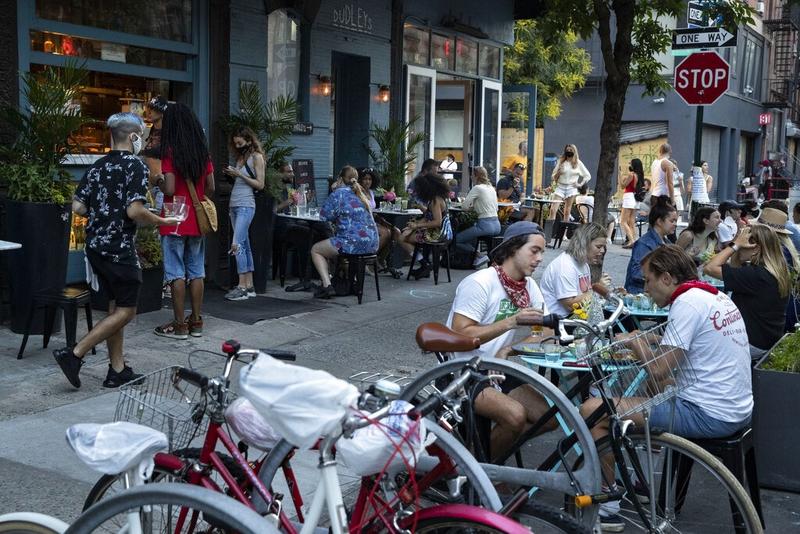 Customers dine at an outdoor area of a restaurant in New York, June 22, 2020. (JOHN MINCHILLO / AP)
Customers dine at an outdoor area of a restaurant in New York, June 22, 2020. (JOHN MINCHILLO / AP)
As increases in the number of the novel coronavirus cases hit record highs in 12 US states, the pandemic also has become more politicized, with US President Donald Trump attributing the rise to increased testing, and the governors of two major states feuding.
Trump said the United States has tested 25 million people, far more than other countries.
"When you do testing to that extent, you're going to find more people, you're going to find more cases. So I said to my people slow the testing down, please," Trump told a campaign rally in Tulsa, Oklahoma, on Saturday.
The president's efforts to slow down desperately needed testing to hide the true extent of the virus mean more Americans will lose their lives.
Nancy Pelosi, House of Representatives speaker, US
House of Representatives Speaker Nancy Pelosi said in a statement on Sunday: "The president's efforts to slow down desperately needed testing to hide the true extent of the virus mean more Americans will lose their lives."
A White House official later said Trump's call for a testing slowdown was in jest.
ALSO READ: Trump's testing slowdown call sparks controversy
Peter Navarro, the White House director of trade and manufacturing policy, said on Sunday that the administration was preparing for the possibility of a second wave of the virus in the fall.
"We are filling the stockpile in anticipation of a possible problem in the fall," Navarro told Jake Tapper on CNN's State of the Union.
Scott Gottlieb, former Food and Drug Administration commissioner, said on Sunday that outbreaks in several states, including Texas, Florida and Arizona, could overwhelm hospital systems if not properly managed.
"We know that there's community spread underway now in states like Florida, Texas, California, for that matter, and Arizona," he said. "Those are big states that have a lot of cases that have been building."
Michael Osterholm, director for the Center of Infectious Research and Policy at the University of Minnesota, speaking on NBC's Meet the Press, compared the virus to a "forest fire".
He said: "I don't think this is going to slow down. I'm not sure the influenza analogy applies anymore. I think that wherever there's wood to burn, this fire is going to burn it."
Cases are rising in 18 states across the South, West and Midwest. Nationally, as of Sunday afternoon, more than 2.2 million confirmed COVID-19 cases have been reported, with over 119,800 deaths, according to a tally kept by Johns Hopkins University.
Meanwhile, the World Health Organization reported on Sunday the largest single-day increase of coronavirus cases across the world, with more than 183,000 new cases in the latest 24 hours.
READ MORE: WHO reports record daily increase in coronavirus cases
Globally, there were 8,844,171 cases with 465,460 deaths by Monday afternoon, according to the WHO.
Eleven US states on Sunday reported new highs in their seven-day averages, with Oklahoma reporting the largest at 16 percent. Florida reported over 4,000 new cases on Saturday, taking its total to 97,000 cases, Reuters reported.
California, Texas, Alabama, Oklahoma and Oregon reported record numbers last week, too.
Although cases have risen, the number of COVID-19 fatalities has plunged. The 14-day average was down more than 40 percent as of Saturday, The New York Times reported.
Governors feuding
Governor Ron DeSantis of Florida, a Republican, said that more younger people are testing positive in the state. But he also took a swipe at the coronavirus response by New York's Democratic Governor Andrew Cuomo, who last week suggested that the state may quarantine visitors from Florida.
"I would just ask if that's done, just please do not quarantine any Floridians in the nursing homes in New York," DeSantis said.
Cuomo has faced criticism for virus-related deaths among the elderly after state health officials in March ordered nursing homes and rehabilitation centers to admit COVID-19 patients who were discharged from hospitals. The order was later rescinded.
DeSantis said that New Yorkers heading to Florida were required to self-quarantine for two weeks upon arrival.
Chen Yingqun in Beijing, Xinhua and agencies contributed to this story.


